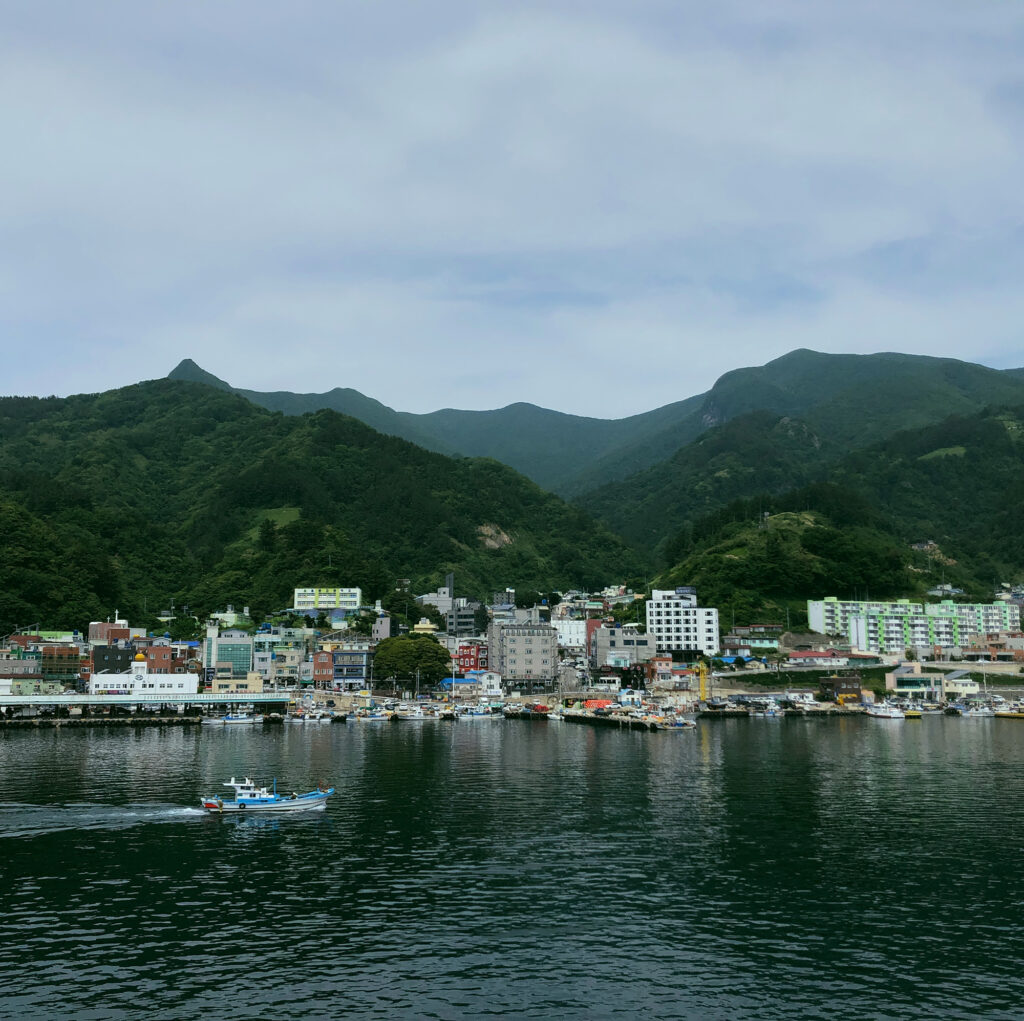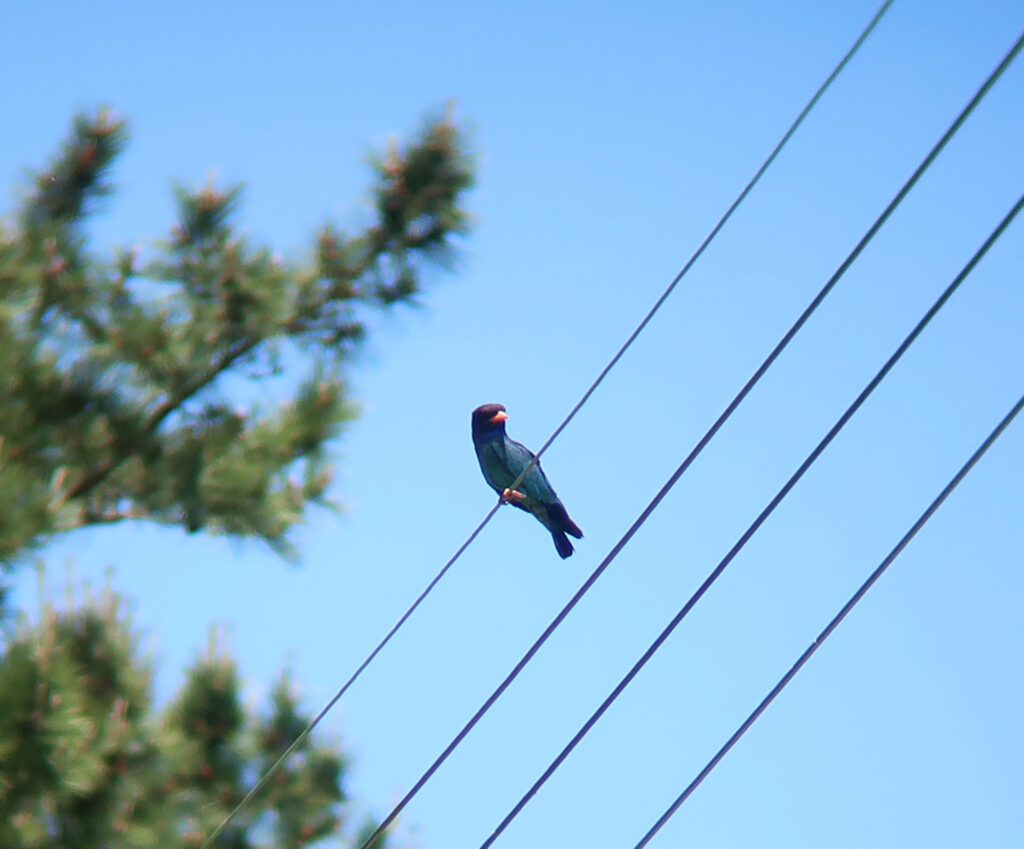
Bird news from Leslie Hurteau.
Gargantuan black pigeons, squid, and pumpkin makgeolli; these are the things that stood out to me during my three day stay on the mysterious Ulleung Island. While birdwatchers in Korea like to visit the many Korean islands in the West Sea, well-known for their migrants in spring and fall, Ulleung Island seems somewhat under-appreciated and not often explored for its birdwatching potential. Having a bit of time at my disposal in late spring, I set off for the mysterious island from June 1st to 3rd, 2020, to satisfy my curiosity and hopefully get a chance to see the famed Black Wood Pigeons.
Leaving from Mukho port, the ferry ride was rather pleasant, with none of the rough seas this ride is sometimes known for. I saw plenty of shearwaters (presumably Streaked Shearwaters) as well as Black-tailed Gulls, and one Grey Heron just off the coast of the mainland. The shearwater numbers peaked around midway of the journey.

Weather on the island was beautiful throughout the entire three days, with a little bit of cloud on the second and third days. I set my base of operations in Jeodong as per recommendation of a friend, and exploration was done mainly on foot, so only a small portion of the island was covered: Jeodong to the Dokdo observatory the first day; Jeodong to Nari Basin the second day; and in and around Jeodong on the third day. The ferry ride on the way back to Pohang was also pleasant and smooth, with sightings of (what were assumed to be) Streaked Shearwaters, as well as Black-tailed Gulls.


Thirty species were seen on the island, with the most common birds being Russet Sparrows, Black-tailed Gulls, Black Wood Pigeons, Grey-capped Greenfinches, Barn Swallows, and Blue Rock Thrush. Unfortunately, no Styan’s Grasshopper Warblers were seen or heard. A more thorough look may have found them, but perhaps it was also a little late in the season for their calls.
The main target species, the Black Wood Pigeon, was fortunately ubiquitous throughout my visit. Over 50 individuals were found on the full second day, and very little effort was required to find them. They were calling regularly, and often found in groups of 3 – 6 individuals, perched on branches sometimes too small for their body weight, with comical results.

Also of note, up to 7 individuals of the local subspecies of White-backed Woodpecker were seen or heard (울도큰오색딱다구리 or Dendrocopos leucotos takahashii). Other potential Ulleung Island subspecies seen included Eastern Great Tits (Parus minor dagetelensis), Varied Tits (Sittiparus varius utsurioensis) and Grey-capped Greenfinches (Chloris sinica clarki). Aside from the White-backed Woodpecker, little information seems to be available on these subspecies and their status, but a Birds Korea writeup addressing the topic can be read here.
A somewhat peculiar sighting was a pair of Common Pochards (one male and female) residing in the Jeodong harbour over the three days. They looked to be in fine form, and it seems likely they were late migrants given it was early June.
Overall it was a pleasant introduction to the mysterious Ulleung Island. A little far to get to, but worth it if the stay is over a few days. It would be interesting to see what species occur at the peak of spring and fall migration, as well as undergoing additional searches for the Styan’s Grasshopper Warblers in the future.


The following is a list of the species encountered, and their approximate counts over the three days:
Common Pheasant Phasianus colchius 꿩. Three seen or heard on the 1st, and 18 seen or heard on the 2nd including six chicks.
Eastern Spot-billed Duck Anas zonorhyncha 흰뺨검둥오리. One seen on the 1st in Jeodong harbour.
Common Pochard Aythya ferina 흰죽지. Two present in Jeodong harbour for all three days.
Lesser Cuckoo Cuculus poliocephalus 두견이. Two heard on the 2nd.
Common Cuckoo Cuculus canorus 뻐꾸기. One heard on the 2nd.
Black Wood Pigeon Columba janthina 흑비둘기. 16 on the 1st, 54 on the 2nd, and 22 on the 3rd. Usually in groups, but sometimes singles as well.

Oriental Turtle Dove Streptopelia orientalis 멧비둘기. Six on the 2nd.
Black-tailed Gull Larus crassirostris 괭이갈매기. Over a hundred (a highly conservative estimate) seen over the three days, including nests with fledglings.
Temminck’s Cormorant Phalacrocorax capillatus 가마우지. One seen on the 1st in Jeodong harbour.
Eastern Cattle Egret Bubulcus coromandus 황로. One seen flying with a group of Great Egret.
Grey Heron Ardea cinerea 왜가리. One seen on the 1st, two on the 2nd, and seven on the 3rd.

Great Egret Ardea alba 중대백로. One seen in the evening on the 1st, 15 seen on the 2nd (two in Nari basin and a group of 13 flying north), and one seen on the 3rd.

Oriental Dollarbird Eurystomus orientalis 파랑새. One seen on the 2nd.

White-backed Woodpecker Dendrocopos leucotos takahashii 울도큰오색딱다구리. Seven seen or heard on the 2nd in the hills surrounding Nari basin.


Bull-headed Shrike Lanius bucephalus 때까치. One seen on the 2nd.
Varied Tit Sittiparus varius 곤줄박이. 15 seen or heard on the 2nd, mainly in the hills surrounding Nari basin.

Eastern Great Tit Parus minor 박새. Eight on the 1st, 18 on the 2nd, and eight on the 3rd.
Brown-eared Bulbul Hypsipetes amaurotis 직박구리. Six on the 1st, 14 on the 2nd, and seven on the 3rd.
Barn Swallow Hirundo rustica 제비. More than 40 seen on each day, with many nests throughout the towns and villages.
Korean Bush Warbler Horornis canturians 휘파람새. One heard on the 2nd.
Arctic Warbler Phylloscopus borealis 쇠솔새. One heard on the 1st near the Dokdo observatory, with the call recorded.
Oriental Reed Warbler Acrocephalus orientalis 개개비. Two heard on the 2nd.
Warbling White-eye Zosterops japonicus 동박새. Two seen on the 1st near the Dokdo observatory.
Pale Thrush Turdus pallidus 흰배지빠귀. Nine seen on the trails north of Nari basin.
Blue-and-white Flycatcher Cyanoptila cyanomelana 큰유리새. Two seen or heard on the 2nd south of Nari basin.

Blue Rock Thrush Monticola solitarius 바다직박구리. Common throughout the island, average 5 – 10 seen on each day.
Russet Sparrow Passer cinnamomeus 섬참새. Very common throughout the island, and it seems to replace the niche that Eurasian Tree Sparrow fills on the mainland. A very rough count of 100 seen over the three days.

Grey Wagtail Motacilla cinerea 노랑할미새. Two seen on the 2nd and 3rd.
White Wagtail Motacilla alba 알락할미새. Roughly 20 seen throughout the three days.
Grey-capped Greenfinch Chloris sinica 방울새. Over 60 seen over the three days (another very rough count). This species was one of the most common birds on the island.

